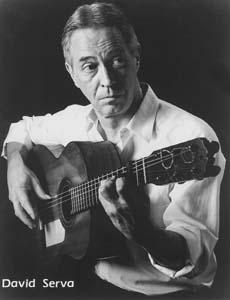![[Metroactive Music]](/music/gifs/music468.gif)
[ Music Index | San Jose | Metroactive Central | Archives ]
 Drenched in Duende: Flamenco guitarist David Serva possesses a musical spirit that is almost mystical in its effects.
Drenched in Duende: Flamenco guitarist David Serva possesses a musical spirit that is almost mystical in its effects.
The Spirit of Spain Three masters of flamenco come to the South Bay By Traci Hukill SOME ARTISTS seem to have a direct line to the subterranean source of their art, as if they enjoy regular long draughts from a private fountain of inspiration. The world is poor in words to describe this blessed state. Jazz has soul. Hula has mana. And then there's the word coined in the south of Spain. "There's a term in flamenco called duende," explains Eddie Diaz, artistic director of the Flamenco Society of San José. "Duende means 'spirit.' When somebody has this incredible passion when they're performing, it's like a ghost taking over the audience. One of the versions I've heard is it's actually a ghost that gets processed in your own body--like this mystical thing." Flamenco twirled onto the public stage 150 years ago from mysterious origins. The only thing people seem to agree on is that it evolved to its present form in the sun-soaked province of Andalusia in southern Spain. To what degree flamenco is influenced by Arab, Jewish and Gypsy culture, however, is a subject of lively debate. The Moors and the Jews both inhabited Spain for centuries before the Christians drove them out in the late 1400s, but the Gypsy lore around flamenco is pervasive, and some of the movements curiously resemble the dances of India and the Middle East, points along the Gypsies' trail. Flamenco combines three elements: cante, baile and toque--singing, dancing and guitar. All three are notoriously hard to master. "Flamenco is probably the most difficult music form in the world, after Indian music," says Diaz, an eight-year student of flamenco guitar. "To play it well takes many, many years. In fact there is a saying in flamenco that it takes 10 years to learn to accompany a dancer, 10 years to learn to accompany a singer, 10 years playing solo guitar, and then you are ready to start learning." He laughs. Diaz and other local flamenco fans are eagerly anticipating the upcoming appearance of a trio of master flamencos: guitarist David Serva, dancer Clara Mora and singer Miguel Funi. The three are performing Saturday (March 11) at the Mountain View Center for the Performing Arts. "David Serva is one of the few Americans that has that duende," declares Diaz. "No Americans have ever made it in Spain in the flamenco world. But I have talked to very famous flamenco performers there, and they consider David to be as good as any of them." SERVA, WHO NOW RESIDES in Madrid, was born in Berkeley and moved to Spain in 1958 at the age of 17 with a bad case of flamenco love. "I just fooled around and listened to people," he says, speaking by phone several days before his departure for California. "The only formal study I had was five classes with the Gypsy master Diego del Gastor," Serva continues, "but then we dropped the classes. We were friends. He would take me everywhere. He let me tune his guitar." To Serva, flamenco is to Spain what jazz is to America: a "minority music" known to few in which improvisation is key. Serva and Miguel Funi, the famed singer who also sometimes dances to his own singing, have not performed together since 1984, but they probably won't practice together before their Mountain View show. Leaving the performance unstructured was a deliberate choice. "These days a lot of flamencos come out of schools," Serva says. "They tend to be very rigid, to put on very mounted numbers that require an enormous amount of rehearsal. Miguel and I don't plan to rehearse at all. But we look at each other and decide. We understand each other still." Dancer Clara Mora, also American-born, got her start in flamenco as a Harvard anthropology student and classical Indian dancer. Discovered by a flamenco teacher in an ethnic-dance class, Mora admits that she was a "dilettante" until she really started listening to the music. "That's what really got me hooked," she says, speaking from the home she shares with Serva in Madrid. "There's something mournful, something about the harshness of it. I like folkloric music, but flamenco was much more than folklore. It just has a kind of power to it that got to me." Critics trip all over themselves trying to describe Mora's fiery, dazzling performances. She's praised for delivering technical virtuosity in a veil of effortlessness--precisely the thing she identifies as the most difficult achievement in flamenco. "In the past 15 years, flamenco has become much more sophisticated technically," she says. "But to capture a style that really makes it look like flamenco, and not just like you're doing steps from a flamenco vocabulary--that's really difficult." For Mora and Serva, the soul of flamenco resides in what the individual can bring to the art form. "Flamencos invent themselves," says David Serva. "Personal style is the main thing. There's a lot of instruction available, and it's a good start, but it's not the real road."
David Serva and Friends perform Saturday (March 11) at 8pm at the Mountain View Center for the Performing Arts, 500 Castro St., Mountain View on Saturday, March 11 at 8pm. Tickets are $18-$22. (650.903.6000) [ San Jose | Metroactive Central | Archives ]
|
From the March 9-15, 2000 issue of Metro, Silicon Valley's Weekly Newspaper.
Copyright © 2000 Metro Publishing Inc. Metroactive is affiliated with the Boulevards Network.
For more information about the San Jose/Silicon Valley area, visit sanjose.com.